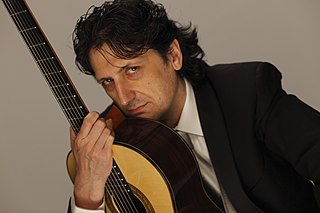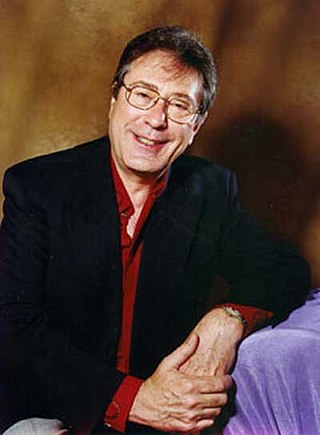Antonio Gallego Gallego | |
|---|---|
| Born | 1942 |
| Died | 2024 |
| Occupation(s) | Writer, musicologist |
Antonio Gallego Gallego (1942-2024) was a Spanish writer and musicologist.
Antonio Gallego Gallego | |
|---|---|
| Born | 1942 |
| Died | 2024 |
| Occupation(s) | Writer, musicologist |
Antonio Gallego Gallego (1942-2024) was a Spanish writer and musicologist.
Antonio Gallego was born in Zamora, Spain in 1942 and was raised in La Vera. He studied at the Colegio Sagrado Corazón of the Society of Jesus in Carrión de los Condes, and music at the conservatories of Salamanca and Valladolid, law at the University of Salamanca, and arts at the Complutense University of Madrid. A disciple of Federico Sopeña, [1] Gallego has been the Technical Secretary of the National Chalcography, [2] a Professor of Aesthetics and History of Music at the Valencia Conservatory, and a Professor of Musicology at the Madrid Royal Conservatory. [3] He directed the Cultural Services of the Fundación Juan March between 1980 and 2005. [4] He was appointed a member of the Real Academia de Bellas Artes de San Fernando in 1996 [5] and a member of the Real Academia de Extremadura de las Letras y las Artes in 2002. [6] A founding member of the Spanish Society of Musicology (SEdeM), Gallego directed its Journal between 1978 and 1980. [7]
In 1992, he wrote the libretto for Miguel Ángel Coria's opera Belisa, adapted from García Lorca's play Amor de Don Perlimplín con Belisa en su jardín . The work premiered on May 15, 1992, at the Teatro de la Zarzuela in Madrid. [8]
El amor brujo , one of the most important works of Manuel de Falla, was first performed in April 1915 in Madrid, Spain. Falla continued to work on the music until completing the 1925 version premiered in Paris, France. Both the original 1915 score and the following 1916 version were considered lost.
In 1986, Antonio Gallego was commissioned to compile a catalog of Manuel de Falla's works kept in his archive. During this task Gallego recovered from sketches the original 1915 version. The reconstruction process is detailed in his book Manuel de Falla y El amor brujo. [9]
Gallego published many articles and a dozen books including:
Manuel de Falla y Matheu was a Spanish composer and pianist. Along with Isaac Albéniz, Francisco Tárrega, and Enrique Granados, he was one of Spain's most important musicians of the first half of the 20th century. He has a claim to being Spain's greatest composer of the 20th century, although the number of pieces he composed was relatively modest.

Joaquín Turina Pérez was a Spanish composer of classical music.

Ataúlfo Exuperio Martín de Argenta Maza was a Spanish conductor and pianist.

El amor brujo is a ballet by Manuel de Falla to a libretto by María de la O Lejárraga García, although for years it was attributed to her husband Gregorio Martínez Sierra. It exists in three versions as well as a piano suite drawn from four of its movements. Andalusian in character, its music includes the celebrated Danza ritual del fuego , the Canción del fuego fatuo and the Danza del terror. Its songs are in Andalusian Spanish.

Gerónimo Giménez y Bellido was a Spanish conductor and composer, who dedicated his career to writing zarzuelas, such as La tempranica and La boda de Luis Alonso. He preferred to spell his first name with a "G", even though his name at birth officially began with a "J".
Ernesto Halffter Escriche was a Spanish composer and conductor. He was the brother of Rodolfo Halffter and part of the Grupo de los Ocho, which formed a sub-set of the Generation of '27.

El Concurso del Cante Jondo was a fiesta of flamenco arts, music, song, and dance, held in Granada in 1922. Conceived and initiated by composer Manuel de Falla, it enjoyed early and strong support from the poet Federico García Lorca. The two-day evening event was held outdoors at the Alhambra. The show included the best of well-known flamenco artists, but the contest's prize money was reserved for amateur performers.

Nancy Fabiola Herrera is a Canarian mezzo-soprano opera singer. Born in Venezuela to Canarian parents, Herrera is the recipient of the "Best Zarzuela Singer of 2007" award presented by the Fundación Premios Liricos Teatro Campoamor, for her performance in Ruperto Chapí's La Bruja.
José Melchor Baltasar Gaspar Nebra Blasco was a Spanish composer. His work combines Spanish traditions with the Italian style of his day.
Sebastián Durón was a Spanish composer.

Paco de Lucía interpreta a Manuel de Falla is the twelfth studio album by the Spanish composer and guitarist Paco de Lucía. All the pieces were written by Manuel de Falla.
Miguel Ángel Coria Varela was a Spanish composer of classical music. His early work showed affinities to the music of Anton Webern, but he became increasingly influenced by Impressionism. From 1973 he entered his post-modern period where his compositions were marked by "attempts to evoke the spirit of the music of the past, but without literal allusions". In addition to his instrumental music, he also composed an opera, Belisa, which premiered at the Teatro de la Zarzuela in 1992. Coria served as the Administrative Director of the RTVE Symphony Orchestra and Chorus in the 1980s and was a co-founder of ALEA, Spain's first laboratory for electronic music.

Juan Manuel Cañizares is a Spanish flamenco guitarist and composer. He is a winner of the "Premio Nacional de Música" (1982) and "Premio de la Música" (2008) awards.

José Antonio Cubiles Ramos was a noted Spanish pianist, conductor and teacher.

Maruja Troncoso Ortega is a Spanish lyric soprano and professor of singing.

José Marín Varona was a Cuban composer, conductor, pianist and professor.
Arturo Tamayo Ballesteros is a Spanish conductor and music teacher.

Pastora Imperio is the artistic name of Pastora Rojas Monje, a dancer from Seville and one of the most representative figures of flamenco folklore of all times. She was the great-grandmother of the Spanish actress Pastora Vega.

Bernardo Adam Ferrero was a Spanish composer, conductor, and musicologist. He is known for conducting concert bands, including the Spanish military bands, and composing music for them. He wrote books about the topic, presented a radio program and directed a festival. His compositions earned him prestigious prizes, and his works are played around the world.
Francisco Cimadevilla González was a Spanish guitarist and composer. He was a contemporary of Francisco Tárrega. Cimadevilla mainly transcribed and arranged several well-known guitar pieces, also composing a small number of lounge music and folk music.